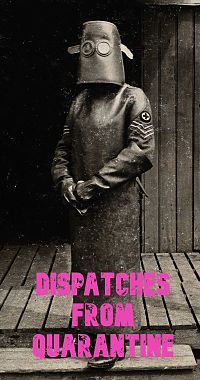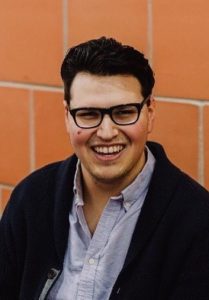 I.
I.
I’m 26 and I’m sitting in a classroom in a prison in a small town in a state like Connecticut. I’m working with an incarcerated man who smells like the interior of a pickup truck my father once owned—like oil, wool, and bubblegum. We’re reading cantos from a famous Italian poem, photocopied onto thick, stapled handouts I printed in a university basement earlier that same day. I’m getting warm. It’s hot in this prison. I begin to perspire, just a little bit. My partner and I talk about hell.
He says, Dante’s got a guide now
Virgil, I say, Virgil’s going to help him walk through hell
But, he says
I wait
I say, What?
But, he says, I thought the point of his transformation was doing it alone
Yes, I think
No, I say, No, I think the point is that we’re never alone
But then our time is up and I leave the prison. I sit on an air-conditioned charter bus with my classmates, hurtling through small town after small town in a state like Connecticut, all of us together, but still kind of alone. We’ll talk about our evenings with our respective partners. Someone will cough. Someone will peel an orange to eat. Someone will whisper into a cellphone, trying not to be heard. We’ll enjoy the quiet kind of togetherness that these bus rides afford us. But then we’ll be home. The bus will lurch to a stop somewhere on campus and we’ll scatter, hurrying back to the small lives we live in our small apartments dotted across the city’s downtown.
II.
I’m 13 and I’m sitting in a classroom in a private school in a smallish big city in a state like Iowa. I’ve just learned a new word: plague. Our teacher slides a photo across a projector screen: a black-and-white photo of fleas she xeroxed from an outdated textbook. Next slide: large sailing ships. Next slide: rats. Next slide: soldiers. Next slide: a crowd of panicked shoppers hidden behind face masks. A long global history of sick. Someone in the last row of desks coughs. I don’t turn my head to see who, but I want to. More slides. Words I’ve seen, but don’t understand: Cholera. Smallpox. Influenza. And then longer words I’ve never seen before: Trypanosomiasis. Encephalitis lethargica. Poliomyelitis. And then words composed exclusively of curt, ominous letters: vCJD. Hep A. HIV/AIDS. I pick at my neck, scratching some phantom itch. More slides. Photo after photo of ancient history. But how distant, I think, calming myself, how very far from where we are now.
III.
I’m 27 and I’m sitting in a classroom in a private university in a college town in a state like Connecticut. I’m alone. I’ve been trying to write but I’ve just read an email from the dean of the school notifying the student body that graduation has been cancelled. An entire life spent in classrooms, but now my time is up. It’s over. I leave. The streets are empty. Most people have fled already. I begin to walk. Before I even understand what it is I’m doing, I say goodbye to my streets as I pass them by: York and Chapel and Park and Howe. I say, Thank you for being my home for three years.

I step into my dark apartment, shadowed by early evening storm clouds. I set a pot of water on the stove to boil. I sit on my ottoman and try to categorize my sadness. I will make a list. I start with what I’ve lost. I write, Everything. No, I say—no hyperbole. I start again. I write, My last months at school. My graduation. I stop.
I want to cry, but I don’t. I cough instead.
I imagine a phantom graduation with my phantom classmates. A faint approximation of who and what we’d look like in our caps and gowns. The dean is eight feet tall in my imagination. He calls me to the podium and asks that I give an extemporaneous speech. The crowd cheers. I beam. I stand tall. I float to the podium. We are phantoms.
I say, I taught in a prison once. The crowd is hushed, captivated. I continue, What I learned is that the painful reality is this: No one is going to shepherd us through the thresholds we’ve been longing to cross. There’s nothing we can do about that. We have been robbed of the transformations, both literal and metaphorical, that our final semester of school promised us. We are academics unfulfilled, students interrupted, Dantes abandoned.
The crowd weeps. I weep with them. But I keep going.
I say, The painful reality is this too: We must become our own Virgils. It is our responsibility now to guide ourselves. The satisfaction we would’ve found in ceremony cannot be replicated, nor should it be.
The crowd suddenly leaps to its feet! We’re in ceremony now, they say! Look at us! Look at all of us here!
I hold my hand in the air. I wait for them to quiet. I can feel the tense strain of them leaning toward me. I say, No. We’re phantoms. This isn’t happening. Do you understand? It’s on us now, all of this. We have to do it ourselves.
The crowd erupts in applause. I’m carried out of the auditorium, held high above everyone’s heads. I hear the water boiling on the stove.
IV.
I’m 21 and I’m sitting in a classroom in a public university in a big city in a state like Nebraska. I’m waiting to walk the length of the university’s campus to the hall where I will walk across a raised platform and graduate. I’m alone. I told my family not to come. You’re sure?, they said. Yes, I said, it’s not a big deal. Just wait for grad school. Come to that one.
V.
I’m—here. It’s today. It’s right now. Here I am. I’m sitting in a virtual classroom in a living room in a quarantined apartment crowded with moving boxes in a state like Connecticut. Someone in the virtual classroom is speaking, but I’ve muted them. I want to disconnect the video so I can cough, but I don’t. I hold it down. I swallow it. I think about everyone I’ve ever loved and who’s ever loved me. I try to imagine them at their high school graduations, their college graduations, their engagement parties, their weddings, their children’s fifth birthdays, their retirement goodbyes. I want to slip through time and visit them at every step, every milestone. I want to shake their hand. I want to tell them, Good job. You did it. I’m proud of you. What’s next? Oh, you’re going to keep going? That’s good. I’m glad. I’m right here with you.
Someone coughs. Was it me? I look up. Someone in the virtual classroom is talking to me. I unmute myself. Yes, I say. That sounds good.
Noah Diaz is (was?) a third-year playwriting student at the Yale School of Drama. His thesis production and graduation were recently cancelled due to COVID-19.

